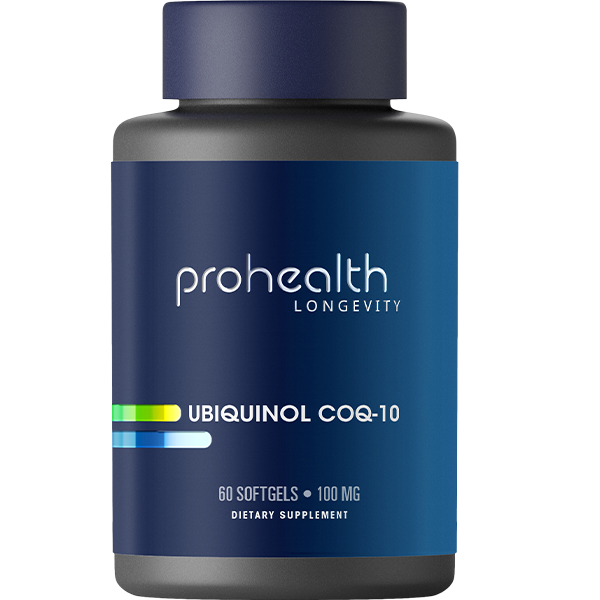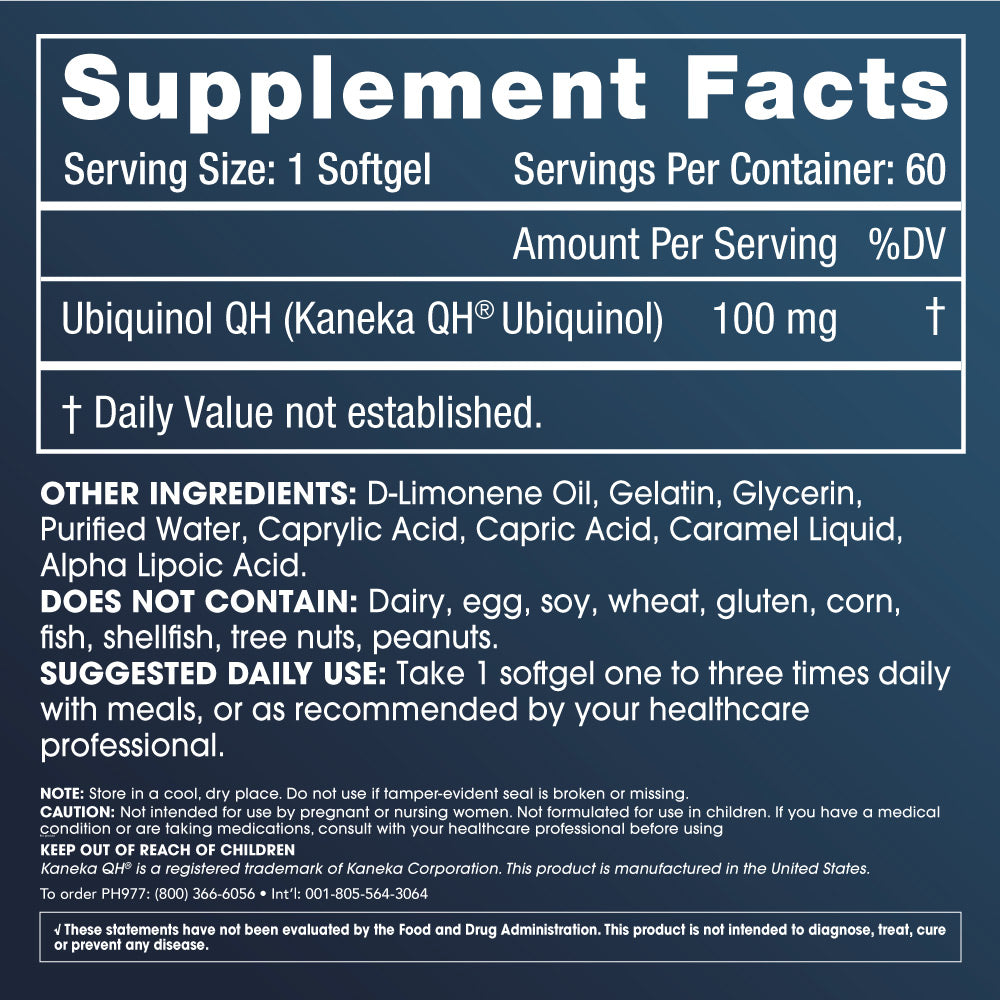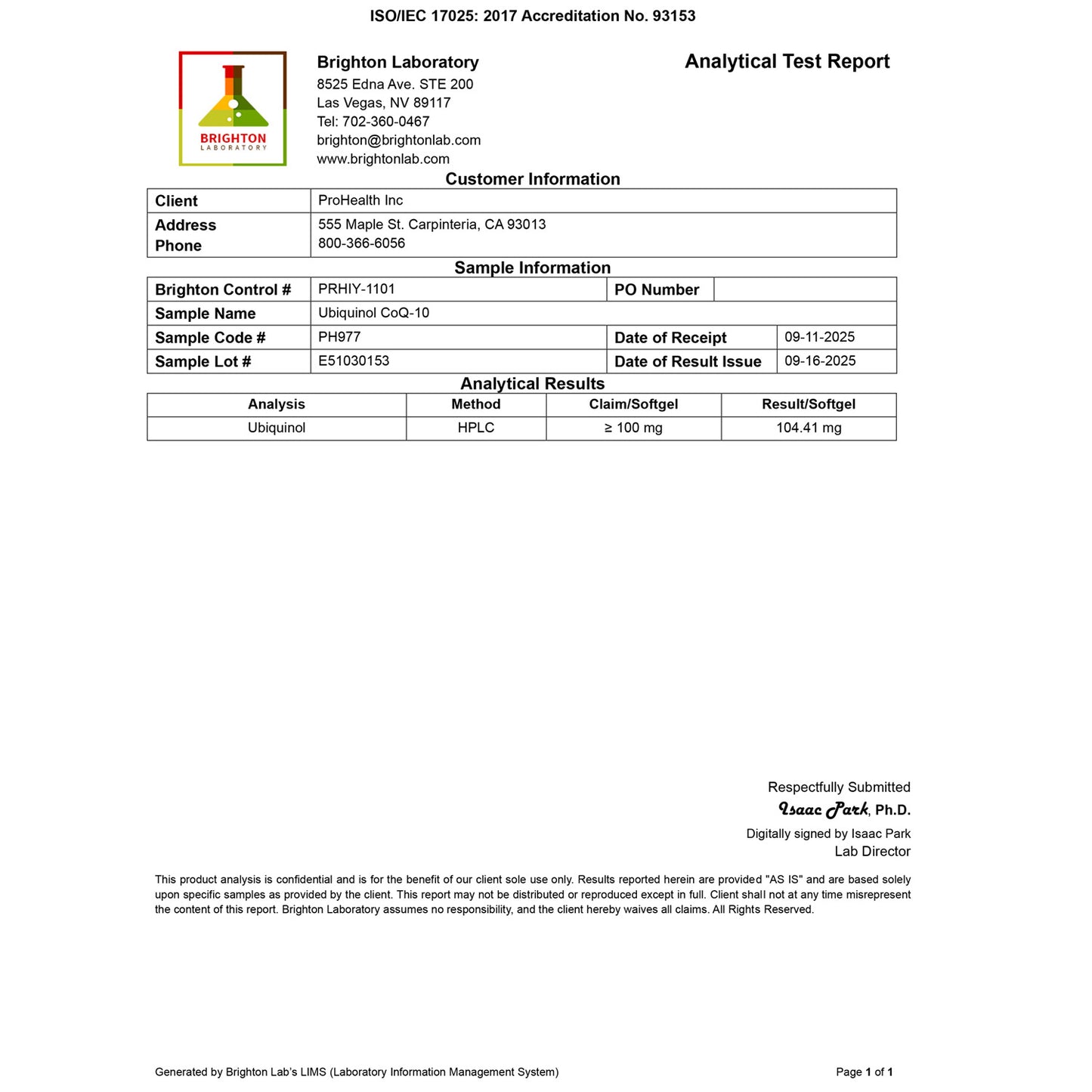- Have questions about this product?
Ask one of our experts. - click here
Free Nutritional Advisor
Free Nutritional AdvisorActive form of CoQ-10 supports energy, cellular health, heart health and cognitive function.
- Helps support ATP production for increased energy levels
- Acts as an antioxidant to fight oxidative stress in cells
- Supports cardiovascular health
- Supports cognitive function
Research-Supported Benefits:
Supports Energy Levels. CoQ10 is an essential coenzyme needed for making ATP from food. Research shows that people who took 20 mg of NADH with 200 mg of coenzyme Q10 for eight weeks had significantly reduced fatigue and increased ATP production.1
Supports Cellular Health. Oxidative damage is a cause of accelerated aging and the development of age-related disorders.CoQ10 is an important antioxidant that fights oxidative stress that damages our cells.2
Supports Cognitive Function. In a recent study, a decline in cognitive capacity and executive functioning—the higher-level cognitive skills involving working memory and mental flexibility—was associated with lower CoQ10 levels in older adults.3 In animals, CoQ10 supplementation CoQ10 supplementation improves learning and memory deficits.3
Supports Heart Health. As a potent antioxidant, CoQ10 may improve endothelial function and enhance cardiac ATP production to support heart health.4
Supports Healthy Aging. If you’re in your 40s and beyond, your natural CoQ10 production has likely dropped—and adding ubiquinol CoQ10 is one way to support energy production and healthier aging as a whole.
References:
1. Castro-Marrero J, Cordero MD, Segundo MJ, et al. Does oral coenzyme Q10 plus NADH supplementation improve fatigue and biochemical parameters in chronic fatigue? Antioxid Redox Signal. 2015;22(8):679-685. doi:10.1089/ars.2014.6181
2. Saini R. Coenzyme Q10: The essential nutrient. J Pharm Bioallied Sci. 2011;3(3):466-467. doi:10.4103/0975-7406.84471
3. Fernández-Portero C, Amián JG, Bella R, López-Lluch G, Alarcón D. Coenzyme Q10 Levels Associated With Cognitive Functioning and Executive Function in Older Adults. J Gerontol A Biol Sci Med Sci. 2023;78(1):1-8. doi:10.1093/gerona/glac152
4. Barcelos IP, Haas RH. CoQ10 and Aging. Biology (Basel). 2019;8(2):28. Published 2019 May 11. doi:10.3390/biology8020028
5. Monsef A, Shahidi S, Komaki A. Influence of Chronic Coenzyme Q10 Supplementation on Cognitive Function, Learning, and Memory in Middle-Aged Rats. Neuropsychobiology. 2019;77(2):92-100. doi:10.1159/000495520
6. Evans M, Baisley J, Barss S, Guthrie N. A randomized, double-blind trial on the bioavailability of two CoQ10 formulations. Journal of Functional Foods. 2009;1(1):65-73. https://doi.org/10.1016/j.jff.2008.09.010.
- Coenzyme Q10 (CoQ10) is a coenzyme—a “helper” molecule that activates and assists other enzymes with functioning properly to make energy from food. CoQ10 also functions as an antioxidant, scavenging for free radicals that harm cells by damaging membranes and proteins. While we often make enough (or consume enough in the diet) of CoQ10 when we’re young and healthy, CoQ10 concentrations steadily decline with age, taking energy production and cell damage mitigation down along with it. In addition to supporting healthy energy levels, CoQ10 may also support the brain and cardiovascular system.
- Ubiquinol is considered the active form of CoQ10 because it’s the form that’s utilized by the body and does not need any additional conversion. Research shows that this form of CoQ-10 provides superior absorption, up to 8 times more than ubiquinone. And since ubiquinol is a pre-converted version of CoQ10, blood levels remain high over a longer, sustained time period.
| Supplement Facts | ||
|---|---|---|
| Serving Size: 1 Softgel | ||
| Servings Per Container: 60 | ||
| Amount Per Serving | %DV | |
| Ubiquinol QH (Kaneka QH® Ubiquinol) | 100 mg |
† |
| † Daily Value not established | ||
Kaneka QH® is a registered trademark of Kaneka Corporation. This product is manufactured in the United States.
-
OTHER INGREDIENTS: D-Limonene Oil, Gelatin, Glycerin, Puried Water, Caprylic
Acid, Capric Acid, Caramel Liquid, Alpha Lipoic Acid. - DOES NOT CONTAIN: Dairy, egg, soy, wheat, gluten, corn, fish, shellfish, tree nuts, peanuts.
-
SUGGESTED DAILY USE: Take 1 softgel one to three times daily with meals, or as
recommended by your healthcare professional. - CAUTION: Not intended for use if you are pregnant or nursing. Not formulated for use in children. If you have a medical condition or are taking medications, consult with your healthcare professional before using this product
-
NOTE: Store in a cool, dry place. Do not use if tamper-evident seal is broken or
missing. KEEP OUT OF REACH OF CHILDREN.
Active Form of CoQ10. Compared to other brands of CoQ-10 that use the less absorbable form, ubiquinone, ProHealth uses the active form of CoQ-10, ubiquinol, which provides up to 8 times superior absorption than ubiquinone. Plus, ubiquinol accounts for 90% of the CoQ10 in our blood and is much more prevalent. Ubiquinol may maintain blood levels of CoQ10 over a more extended period than ubiquinone.
Exception Source of CoQ-10. Supplements like ProHealth’s Ubiquinol CoQ-10 use ubiquinol from Kaneka, a Japanese company that’s been researching CoQ10 and its varieties for over 30 years, providing exceptional stabilization technologies to increase absorption further.
Salicylate Free. Compared to other brands, our Ubiquinol CoQ-10 is salicylate free.
Quality Manufacturing Practices. All of our products are manufactured in an FDA-registered, GMP-certified facility.
Third-Party Tested in the USA. Every batch is third-party tested in US laboratories to ensure the highest quality, purity and potency. Certificates of Analysis are available.








